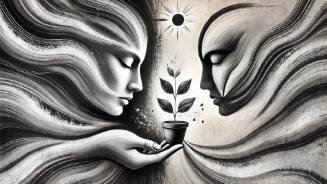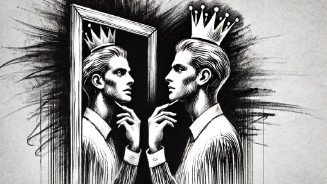Authenticity vs. Narcissism: This is How an Authentic Person Handles a Narcissist
Learn through my personal experience how authentic individuals navigate encounters with narcissists.

Navigating through life, I’ve often wondered if there are people out there who can effortlessly deal with narcissists, those challenging individuals who seem to thrive on manipulating and controlling others.
This curiosity led me to a fascinating realization about authenticity and its powerful impact on narcissistic behavior.
So, join me as I share John’s story and explore how embracing our true selves can empower us to handle even the most challenging narcissistic behaviors.
Understanding Authenticity
Authenticity is a term we hear a lot, but what does it really mean? From my perspective, authenticity is about living in alignment with our true meaning and purpose.
Authentic individuals have a deep self-awareness, a balanced view of their strengths and weaknesses, and an impressive level of emotional regulation.
They can express vulnerability when appropriate and maintain a serene, kind demeanor. These are the people who, despite life’s chaos, remain calm and grounded.
Meeting an Authentic Person
Let me share a story about a person I met who embodied authenticity.
We’ll call him John.
John was in his late 50s, a gentle soul with a peaceful aura. His life wasn’t a bed of roses; he had faced significant challenges and traumas.
Yet, he had a unique way of handling life that was both inspiring and enlightening.
John’s Interactions with Narcissists
One evening, I witnessed John in a social setting where a narcissistic individual was present. This narcissist, let’s call him Mike, was doing what narcissists do best—seeking attention and validation.
Mike interrupted conversations, boasted about his achievements, and tried to dominate every interaction.
John, however, was unfazed.
When Mike interrupted a conversation about a new project to talk about his expensive car, John responded with a polite, “That sounds like a nice car,” and smoothly redirected the conversation back to the project.
He acknowledged Mike’s comment without giving it undue attention, subtly showing that Mike’s attempts to dominate the conversation wouldn’t succeed.
Another time, during a heated debate, Mike tried to provoke John with a personal attack. Instead of reacting defensively, John calmly said, “I understand your perspective,” and continued to share his own views without getting flustered.
It was as if Mike’s words had no power over him.
Authenticity is a Superpower
What struck me most about John was his ability to remain calm and collected, no matter what. He didn’t personalize Mike’s behavior.
Instead, he saw it for what it was—a manifestation of Mike’s insecurities and need for validation.
This wisdom and self-possession made John virtually immune to Mike’s manipulations.
Authentic people like John don’t need to shame or confront narcissists aggressively. They maintain their truth and transparency, making it difficult for narcissists to get under their skin.
They know when to step away from uncomfortable situations gracefully, saying things like, “It’s been a great evening, but I need to head out. Thank you for the lovely time.” This self-assuredness is their greatest strength.
Narcissists Get Frustate with Authentic People
Narcissists thrive on eliciting reactions and controlling others. When they encounter someone like John, who doesn’t react as expected, they become frustrated.
Their usual tricks don’t work, and this can be unsettling for them.
Narcissists might speak poorly about authentic people behind their backs, labeling them as snobby or standoffish, simply because they can’t control them.
Becoming an Authentic Person
Becoming authentic isn’t easy.
It requires deep self-awareness, emotional work, and often, years of life experience. Most authentic people I’ve met, like John, are older, having walked the hard yards of life.
They have integrated their life lessons, faced their demons, and emerged stronger.
But this journey is worth every effort.
Authenticity protects us from narcissistic manipulation and helps us stay true to ourselves. It’s about living in sync with who we are, not with what we believe the world demands of us.
Frequently Asked Questions
1. What is authenticity?
Answer: Authenticity is living in alignment with your true meaning and purpose. Authentic individuals have a deep self-awareness, an accurate understanding of their strengths and weaknesses, and maintain strong emotional regulation. They express vulnerability appropriately and are often serene and kind.
2. How can authenticity protect me from narcissists?
Answer: Authenticity helps you remain grounded and less reactive to a narcissist’s manipulations. Authentic people don’t personalize the narcissist’s behavior and can see through their tactics, which frustrates narcissists and diminishes their control.
3. Can anyone become authentic?
Answer: Yes, anyone can become authentic, but it requires deep self-awareness, emotional work, and often, life experience. It’s about understanding and accepting yourself fully and living in accordance with your true values and beliefs.
4. How do authentic people handle narcissistic behavior?
Answer: Authentic people handle narcissistic behavior with grace and composure. They don’t get flustered or react defensively. Instead, they acknowledge the narcissist’s comments without giving them undue attention and smoothly redirect conversations. They know when to step away from uncomfortable situations gracefully.
5. Why do narcissists get frustrated with authentic people?
Answer: Narcissists get frustrated with authentic people because their usual tactics of seeking validation and control don’t work. Authentic people don’t provide the narcissistic supply that narcissists crave, and they remain unflappable and composed, which can be unsettling for narcissists.
6. Can you give an example of how an authentic person might interact with a narcissist?
Answer: Sure. If a narcissist interrupts a conversation to boast about their achievements, an authentic person might respond with a polite acknowledgment, such as, “That sounds interesting,” and then smoothly redirect the conversation back to the original topic. They don’t give the narcissist the attention they seek and remain calm and composed.
7. What steps can I take to become more authentic?
Answer: Becoming more authentic involves:
- Self-awareness: Understand your true values, strengths, and weaknesses.
- Emotional work: Address and process past traumas and emotional baggage.
- Living in alignment: Make choices that reflect your true self and purpose.
- Transparency: Be honest and open about your feelings and thoughts.
- Self-care: Prioritize your well-being and set healthy boundaries.
8. How do authentic people know when to step away from a narcissistic situation?
Answer: Authentic people are in tune with their emotions and know when a situation feels uncomfortable or draining. They gracefully step away by saying something like, “It’s been great, but I need to leave now,” without feeling the need to justify themselves or worry about others’ opinions.
9. Are older people more likely to be authentic?
Answer: Authenticity often comes with age and experience. Older individuals may have gone through significant life challenges and learned valuable lessons, helping them become more self-aware and emotionally regulated. However, authenticity is achievable at any age with conscious effort and self-work.
10. Can someone have a history of narcissistic relationships and still become authentic?
Answer: Absolutely. Many authentic people have experienced narcissistic relationships. They have integrated those experiences, learned from them, and done the necessary emotional work to become more self-aware and resilient. Their past challenges have often contributed to their authenticity.
Conclusion
If there’s one thing I hope you take away from John’s story, it’s the value of striving for authenticity. It’s a journey filled with self-discovery and growth, leading to a life where narcissists hold no power over you.
So, let’s work on becoming more authentic, day by day, and find that serene, unshakeable core within ourselves.
Thanks for joining me on this reflection. Let’s support each other in this community, learn, grow, and become more authentic in the face of life’s challenges.
And bear in mind that, the more authentic you become, the more resilient you will be against narcissists and their antics.
That’s it folks.
Thank you for reading my article.







